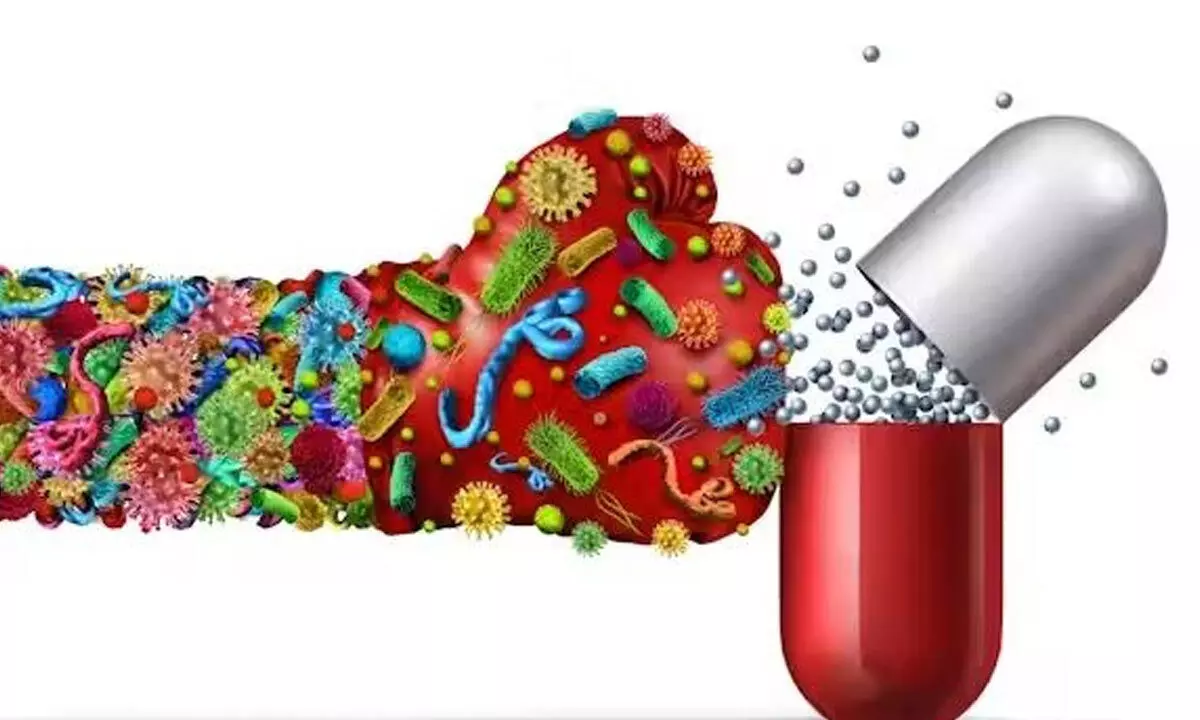Pervasive threat of antibiotic resistance

Scientists, medical fraternity, health regulators and policy makers are in a quandary over the pervasive incidence of resistance to antibiotics which results in disease causing (pathogenic) bacteria developing immunity against the drugs.
Scientists, medical fraternity, health regulators and policy makers are in a quandary over the pervasive incidence of resistance to antibiotics which results in disease causing (pathogenic) bacteria developing immunity against the drugs.
Antibiotic resistance is part of a broader category termed as Antimicrobial Resistance (AMR) that includes other pathogens including fungus, virus and parasites. Antibiotic drugs are prescribed in the treatment of injuries and multiple ailments including TB, Typhoid, Pneumonia, sinus infections and bronchitis, urinary tract infections, etc. The drug is part of the post operative medications and administered to curb and prevent the spread of infections. Antibiotic resistance could mean infections and infectious diseases caused by pathogenic bacteria becoming chronic and hard-to-treat apart from a possible increase in mortality rates. For instance, Tuberculosis is taking a heavy toll due to the bacteria i.e., Mycobacterium tuberculosis, becoming antibiotic-resistant due to inappropriate and incorrect consumption of antibiotics. These drug-resistant bacteria are transmitted from person to person in hospitals and crowded places. In addition to indiscriminate consumption, there are two other extraneous causatives that induce drug immunity in bacteria and trigger their widespread occurrence and transmission – Antibiotic contamination of streams and rivers caused by human and animal excreta, and, drug effluents discharged by the Pharmaceutical industries.
According to scientists, the resistance strain or trait in bacteria is induced by its exposure to, or co-existence with, the antibiotics in the environment – water sources, in these cases. In antibiotic-contaminated rivers or streams, this trait gets replicated and transferred among all the pathogens in the environment. These pathogens, once imbibed by the human body, trigger infections that are incurable because of their immunity to antibiotics. The resistant pathogens located in the gut region enter the blood streams and cause various types of infections. A sampling of 91 rivers across the world has indicated that nearly 60% of sampled sites revealed presence of antibiotics or antibiotic contamination. Widespread prevalence of antibiotic contamination caused by effluents has been traced in water sources located in the vicinity of Pharmaceutical industries.
Hyderabad, the bulk drug capital of India, has the dubious distinction of becoming a cauldron of contamination with pharmaceutical companies spewing toxic effluents, including antibiotics, into the environment and water sources. 20% of the India’s generics are produced in Hyderabad which also accounts for 50% of India’s drug exports. Antibiotics and anti-fungals (drugs which act against fungal infections) comprise a huge chunk of the exports from the city.
The violation of pollution norms by the pharmaceutical companies have been happening unfettered over many years due to lack of monitoring by the concerned authorities and rampant violation of pollution norms by the industry managements. The critically polluted Patancheru – location of a majority of bulk drug companies – is a pointer to the perpetuation of calamities. Samples tested from water sources in the vicinity of the drug companies in Patancheru by a team of scientists from Leipzig University, had exposed the prevalence of antibiotic contamination and presence of bacteria which were resistant to multiple drugs.
The researchers tested 28 water samples in and around Patancheru-Bollarum industrial area where more than 30 drug manufacturing companies are located. The tests revealed that almost all the samples contained bacteria and fungi which were resistant to multiple drugs. The study also revealed antifungal drug contamination in 13 of these samples. In addition to Patancheru, the Musi River in Hyderabad was a repository of humongous quantities of toxic waste including antibiotic effluents channeled from the Pharma industries.
In the not-too-distant future, similar to the case of Mycobacterium tuberculosis’ resistance to drugs – for which a solution is yet to materialise – antibiotics may prove to be totally ineffective in the treatment of infections and infectious diseases caused by pathogenic bacteria. Since there is no alternative to Antibiotics for the treatment of bacterial infections, the resistance to these drugs would mean pathogens becoming unstoppable and the diseases caused by them, assuming chronic or life-threatening proportions. Such an eventuality is substantiated by a UK study, which warns that by 2050, antimicrobial-resistant infections could be the leading cause of death worldwide.
Proliferation of antibiotic resistant pathogenic bacteria portends a disaster waiting to happen with solutions or a deterrent to combat a possible catastrophe yet to materialize. While environmentalists across the world are focusing on plastic and various other causatives of air and water pollution, a lethal manifestation in the ecosystem - antibiotic contamination of water sources and the consequent bacterial resistance to these drugs – is inexplicably, not being accorded its deserved priority.
(Writer is a senior print, digital and electronic media















